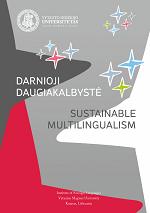Fonētisk o līdzekļu apgu ves specifika daud zval odības apst ākļos
Specificity of Phonological Acquisition in Multilingual Context
Author(s): Dzintra ŠulceSubject(s): Foreign languages learning
Published by: Vytauto Didžiojo Universitetas
Keywords: segmental and supra-segmental units; accent; word stress; intonation; phonology
Summary/Abstract: Languages share a content common to all people; however, Languages share a content common to all people; however, they differ with regard to their specific and nation-dependent phonetic means used to express it. These phonetic means grant a particular sound to each language. A phonetic system is usually based on segmental units: phonemes, syllables and syntagms. The main units of a phonetic system are closely interrelated with super-segmental or supra-segmental units, namely intonation and word stress. The present study overviews the newest tendencies in the phonetic system of the Latvian language developed due to articulatory and acoustic influence of other languages, usually English, German and Russian. The conclusions drawn in the study are based on rich teaching experience at Liepaja, Klaipėda and Vytautas Magnus Universities. It can be generalized that for successful communication both written and oral forms of language are used. When trying to integrate into any institute of higher education in Latvia, foreign teachers and students have to pay attention to the specificity of Latvian phonetic means as, for example, the stress on the first syllable. The acquisition of specific features in Latvian phonetics is influenced not only by phonetic properties of one’s native language, but also by various linguistic and extra-linguistic contextual factors. A current tendency that can be observed in Latvia is a growing number of Latvians who have good communicative competence of several languages and are well acquainted with the history and culture of different countries. Their presence in the society increases the possibilities of expanding international contacts and communication and thus intensifying the aforementioned influence on the phonetic structure of the Latvian language.
Journal: Darnioji daugiakalbystė
- Issue Year: 2012
- Issue No: 1
- Page Range: 88-95
- Page Count: 8
- Language: Latvian

